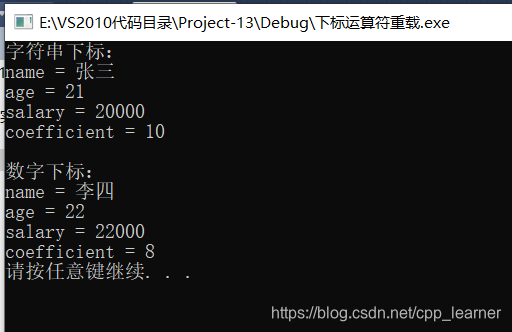[ ] 运算符重载,在一些特定的场合会有奇效;
具体方法和关系运算符,赋值运算符等都是一样的;
它有两种形式:
字符串下标法 和 数字下标法
我将举一个例子详细说明 [ ] 运算符重载会在哪些场合使用,后续又该如何优化…
需求:
1.定义一个Boy类,里面有private成员name, age, salary 和 coefficient;
2.根据Boy类定义出两个对象boy1 和 boy2 并赋值:
Boy boy1(“张三”, 21, 20000, 10);
Boy boy2(“李四”, 22, 22000, 8);
3. 利用字符串下标法 和 数字下标法将他们打印出来
4. 将代码进行优化
1.定义一个Boy类,里面有private成员name, age, salary 和 coefficient;
Boy.h
#pragma once
#include <string>
class Boy {
public:
Boy(const char *name = "无名", int age = 0, int salary = 0, int coefficient = 0);
~Boy();
char *getName() const;
// 下标运算符重载
const int operator[](std::string index) const; // 字符串下标
int operator[](int index) const; // 数字下标
private:
char *name;
int age;
int salary;
int coefficient; // 系数
};
Boy.cpp
#include "Boy.h"
Boy::Boy(const char *name, int age, int salary, int coefficient) {
this->name = new char[strlen(name)+1];
strcpy_s(this->name, strlen(name)+1, name);
this->age = age;
this->salary = salary;
this->coefficient = coefficient;
}
Boy::~Boy() {
if (name) {
delete[] name;
}
}
char* Boy::getName() const {
return name;
}
// 字符串下标
const int Boy::operator[](std::string index) const {
if (index == "age") {
return age;
} else if (index == "salary") {
return salary;
} else if (index == "coefficient") {
return coefficient;
} else {
return -1;
}
}
// 数字下标
int Boy::operator[](int index) const {
if (index == 0) {
return age;
} else if (index == 1) {
return salary;
} else if (index == 2) {
return coefficient;
} else {
return -1;
}
}
2.根据Boy类定义出两个对象boy1 和 boy2 并赋值:
Boy boy1(“张三”, 21, 20000, 10);
Boy boy2(“李四”, 22, 22000, 8);
#include <iostream>
#include "Boy.h"
using namespace std;
int main(void) {
Boy boy1("张三", 21, 20000, 10);
Boy boy2("李四", 22, 22000, 8);
******3. 利用字符串下标法 和 数字下标法将他们打印出来******
/********************************************************/
cout << "字符串下标:" << endl;
cout << "name = " << boy1.getName() << endl;
cout << "age = " << boy1["age"] << endl;
cout << "salary = " << boy1["salary"] << endl;
cout << "coefficient = " << boy1["coefficient"] << endl;
cout << endl << "数字下标:" << endl;
cout << "name = " << boy2.getName() << endl;
cout << "age = " << boy2[0] << endl;
cout << "salary = " << boy2[1] << endl;
cout << "coefficient = " << boy2[2] << endl;
system("pause");
return 0;
}
运行截图:

4. 将代码进行优化
代码中还有那些地方可以进行优化的呢?
其实可以优化的地方就在下标当中:
1.字符串下标中,下标是常量字符串,如果在写代码时写错了,编译器并不会报错,也可以正确运算,只是会找不到对应的数据,最总返回-1;而且如果上百万行代码,使用字符串常量下标的话,如果有一处需要修改,那么需要把这上百万代码都该掉,这是一个很大的工作量,所以,优化应使用宏定义最佳。
2.数字下标中,下标是数字,不可读,看着数字0, 1, 2… 看代码的人并不知道这些数字代表的是什么意思,所以,优化应使用枚举类型最佳。
一、字符串下标优化
在Boy.h中定义宏定义:
#define AGE_KEY "age"
#define SALARY_KEY "salary"
#define COEFFICIENT_KEY "coefficient"
二、数字下标优化
在Boy.h中定义枚举类型
typedef enum {
AGE,
SALARY,
COEFFICIENT
};
Boy.h 代码优化
#pragma once
#include <string>
#define AGE_KEY "age"
#define SALARY_KEY "salary"
#define COEFFICIENT_KEY "coefficient"
typedef enum {
AGE,
SALARY,
COEFFICIENT
};
class Boy {
public:
Boy(const char *name = "无名", int age = 0, int salary = 0, int coefficient = 0);
~Boy();
char *getName() const;
// 下标运算符重载
const int operator[](std::string index) const; // 字符串下标
int operator[](int index) const; // 数字下标
private:
char *name;
int age;
int salary;
int coefficient; // 系数
};
Boy.cpp 代码优化
#include "Boy.h"
Boy::Boy(const char *name, int age, int salary, int coefficient) {
this->name = new char[strlen(name)+1];
strcpy_s(this->name, strlen(name)+1, name);
this->age = age;
this->salary = salary;
this->coefficient = coefficient;
}
Boy::~Boy() {
if (name) {
delete[] name;
}
}
char* Boy::getName() const {
return name;
}
const int Boy::operator[](std::string index) const {
if (index == AGE_KEY) {
return age;
} else if (index == SALARY_KEY) {
return salary;
} else if (index == COEFFICIENT_KEY) {
return coefficient;
} else {
return -1;
}
}
int Boy::operator[](int index) const {
if (index == AGE) {
return age;
} else if (index == SALARY) {
return salary;
} else if (index == COEFFICIENT) {
return coefficient;
} else {
return -1;
}
}
main函数代码优化
#include <iostream>
#include "Boy.h"
using namespace std;
int main(void) {
Boy boy1("张三", 21, 20000, 10);
Boy boy2("李四", 22, 22000, 8);
/*cout << "字符串下标:" << endl;
cout << "name = " << boy1.getName() << endl;
cout << "age = " << boy1["age"] << endl;
cout << "salary = " << boy1["salary"] << endl;
cout << "coefficient = " << boy1["coefficient"] << endl;
cout << endl << "数字下标:" << endl;
cout << "name = " << boy2.getName() << endl;
cout << "age = " << boy2[0] << endl;
cout << "salary = " << boy2[1] << endl;
cout << "coefficient = " << boy2[2] << endl;*/
cout << "字符串下标:" << endl;
cout << "name = " << boy1.getName() << endl;
cout << "age = " << boy1[AGE_KEY] << endl;
cout << "salary = " << boy1[SALARY_KEY] << endl;
cout << "coefficient = " << boy1[COEFFICIENT_KEY] << endl;
cout << endl << "数字下标:" << endl;
cout << "name = " << boy2.getName() << endl;
cout << "age = " << boy2[AGE] << endl;
cout << "salary = " << boy2[SALARY] << endl;
cout << "coefficient = " << boy2[COEFFICIENT] << endl;
system("pause");
return 0;
}
运行截图:

完美运算, 而且优化也完美!
使用 [ ] 运算符重载的优点: 可以使代码更可读。
总结:
1.在写代码时,应尽量避免常量,使用宏定义代替它;
2.写代码能优化尽量优化,这时初级程序员和高级程序员的分水岭;
3.返回值类型不同不能重载:
在代码中,我并没有把name也写入[ ] 重载运算函数中,也并没有独立写一个,
const int operator[ ] (std::string index) const;
const std::string operator[ ] (std::string index) const;
这样写会报错的,编译器不允许这样写,这是一个的注意的地方。
